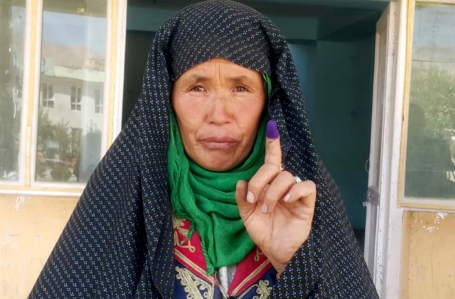
Afghans across the country began casting their votes in the third presidential election on Saturday by defying threats from insurgents who vowed to disrupt the process at any cost.
Thousands of security force members were deployed to secure the much-awaited process, which has been delayed twice.
TOLOnews correspondents covering the voting in various provinces say that turnout is weaker than in elections past, and women’s participation has been particularly weak.
Kabul
Although voting formally started in Kabul around 7:00 am local time, there were delays, some people report, as workers did not show up on time.
A problem reported in Kabul—as well as in other provinces—was the lack of the voter’s name on the registered list, even if the voter had registered and voted in the earlier parliamentary election. Also, there were complaints about technical problem with biometric identification devices, although the election commission had anticipated these problems and reportedly provide back-up biometric devices, and technical people standing by
All presidential candidates casted their votes in Kabul.
Balkh
Elections were also held in the northern province of Balkh under tight security. The election commission claimed 465,000 voters were registered in Balk. The province is also at the top of the list for non-secure polling places, with 124 polling centers closed because of threats.
According to Balkh governor Eshaq Rahguzar, the centers which remained closed are located in nine districts
There were reports hear about biometric devices, as elsewhere.
Jawzjan
People in the northern province of Jawzjan also went to the polling centers to elect their next president.
They said that no threat will prevent them from exercising their democratic rights.
Local officials said that 55 polling centers remained opened in the province.
TOLOnews reporter Arif Musavi said that women’s participation was less than males.
Helmand
Although the presence of the Taliban in Helmand prevented the people from casting their votes in at least five districts, residents in the provincial capital Lashkar Gah and in another eight districts managed to cast their votes.
Local officials in Helmand said that turnout in the election was weak. Also, residents complained about the biometric devices and the incomplete voters list.
Kunduz
People in Kunduz also started voting at 8:00 am. The Afghan security forces had taken tight security measures in the province in the wake of a recent attack by the Taliban on the city, which is strategically important
According to the election commission, seven polling stations remained closed in the province because of Taliban threats.
Farah
Voting started with a half-hour delay in Farah province, but later on people started voting for their favorite candidate. 11 polling centers remained closed in Farah because of threats. The Biometric devices were criticized here, as elsewhere.
Baghlan
In Baghlan too, the voters lined up to cast their ballots in the elections under tight security measures where recently Afghan forces were required to face off with the Taliban groups.
The election commission had said that 12 polling centers were closed in the province. Insurgents fired several mortars to disrupt the process in Baghlan.
Kandahar
People in the southern province of Kandahar also came out of their homes to cast their votes in favor of democracy through the ballots. They also criticized the IEC for not handling the election process in the right way.
Residents in Kandahar have asked the IEC to ensure legitimacy and credibility of the elections.
Nangarhar
TOLOnews correspondent Khalik Nekzad reports from the eastern province of Nangarhar that he saw many people, including female voters, flocking to the voting centers to exercise their democratic rights.
Meanwhile, security officials in the province promised that the Afghan Security and Defense Forces (ANDSF) are on red alert to handle any threats facing the country.
There are 456 polling centers in Nangarhar and 61 of them will remain closed due to threats.



